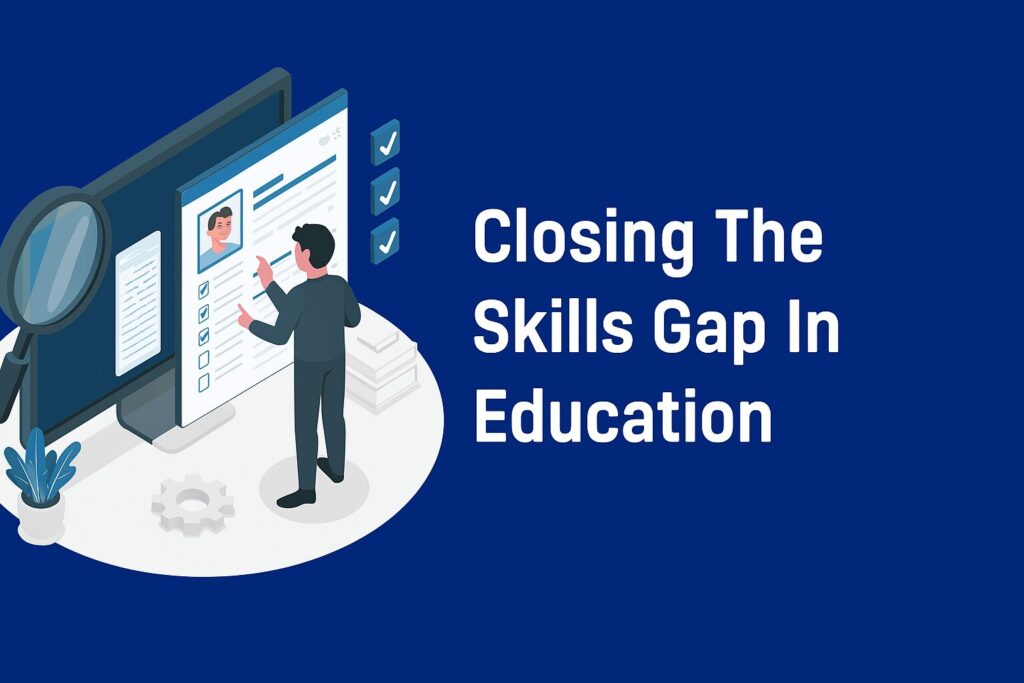
Picture a student who just graduated University, and walking into their first job. They have all the academic knowledge they need to be successful, but now is faced with workplace expectations. They know how to solve quadratic equations or write essays about historical revolutions or memorize the periodic table, but when you ask to think through a meeting with critical thinking or acknowledge their use of time to complete their responsibilities (i.e. deadlines) – they completely freeze.
This is part of the growing skills crisis in education – a silent crisis that is negatively affecting our students, employers and the economy. As we continue to move rapidly towards more artificial intelligence, automation and globalization – we need to ask ourselves how we are preparing students in the classroom with the skills required to succeed in the real world?
What is the “skills gap” in education?
The “skills gap” describes the gap between what students actually learn in schools, and then what is expected of them during their careers a few years later. Just because they do well on a standardized test does not mean they will become employable. “Skills gap” students lack include:
- Creative Solution Skills: Employers value those who have critical thinking skills that develop creative solutions.
- Communication Skills: Students must demonstrate clear and confident speaking or writing to be a good team member/leader.
- Emotional Intelligence: Understanding and managing emotions and developing strong working relationships.
- Leadership & Initiative: Ownership and proactivity will always outperform instructions.
- Technological Competence: All industries now expect basic digital skills.
Due to an overly theory-laden education, most students cannot acquire these ‘real world’ skills. To remain relevant, the system must prioritize the basics of these practical and future-ready techniques.
Why the Current Curriculum is Inadequate
- Outdated Pedagogy
Most classrooms still use the chalk-and-talk teaching model which fails to inspire creativity or independent thought. Students are taught to memorize, rather than innovate.
- Limited Access to Industry Practice
Schools rarely provide students with hands-on practice and experience in industry settings so ultimately, students leave school with no understanding of how their knowledge is applied in real jobs.
- Overemphasis on Assessment
Examinations are based on memory not mastery. This required cognitive overload, necessary for paper performance, sidelines the development of a range of soft skills that satisfy the demands of today’s workplace, such as empathy, negotiation, and emotional intelligence.
- Lack of Life Skills
Skills like financial planning, mental health awareness, time management or entrepreneurship are barely mentioned, despite being a cornerstone of adulthood.
What employers want
Today, recruiters care more about skills than scores. Research by LinkedIn and the World Economic Forum shows that employers are looking for the following top skills:
- Creative problem solving
- Emotional Intelligence
- Leading and Taking Initiative
- Tech Savvy
- Communication and Interpersonal Skills
This is in stark contrast to what most students learn over years in school.
Bridging the Gap: what can we do?
Education is going to need a systematic overhaul if we want to adequately prepare students for the world. Here is what we need to do:
- Implement Project-Based Learning: Provide students with access to real-world problems and challenges and allow students to work and produce meaningful outcomes.
- Promote Internships and Industry Connections: Early exposure to the culture of work and the expectations outside the classroom prepares students to assimilate into the workplace.
- Teach Life Skills and Career Readiness: Examples include budgeting, resumes, coping with stress, and ethical decision-making.
- Embrace Technology: Use digital tools and platforms as part of everyday learning.
- Promote Lifelong Learning: Ask for curious minds, not compliant minds.
Conclusion: Time to Reimagine, Not Just Reform
The future will not wait for us, and neither should education. If we continue to educate students as we have done for decades, we are denying them the skills that they require to engage with the complexities of the future.
We need to rethink what we teach, how we teach it, and why we teach it. The end goal of education is not simply to produce good test-takers, but capable, confident, curious learners in the real world.


